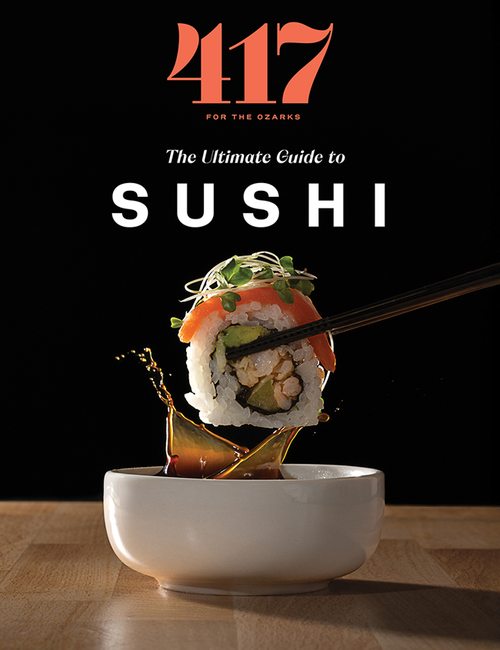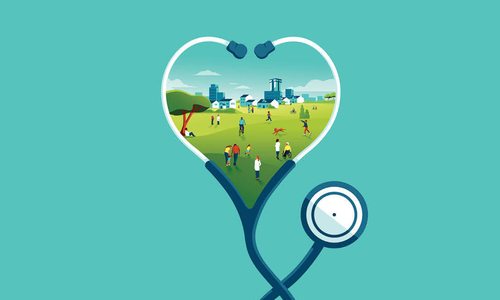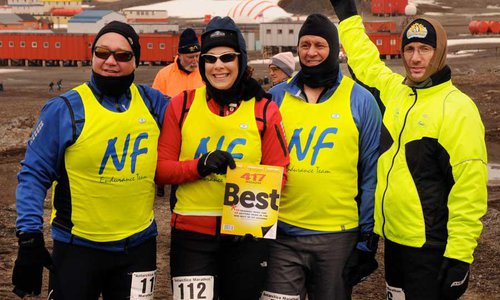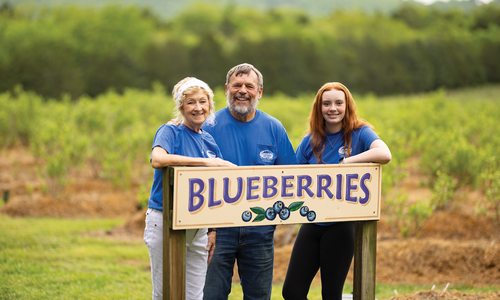
417 Magazine: When did you find your cancer?
Mary H. Duff, M.D.: I found a lump in February 2015. I had just had a normal mammogram six months before in the previous fall, but one day I was getting changed and noticed a lump. I looked in the mirror and went, “Oh, no.” One of the top research and clinical areas of excellence at the University of Kansas Medical Center [where Dr. Duff studied] is Breast Cancer Research, and when I was in training I spent quite a bit of time working with breast cancer patients and providing their gynecologic care. Anyhow, I had felt plenty of breast cancers in my life, so I knew exactly what I was feeling.
417: What did you do after spotting the lump?
M.D.: I tried to stay calm and called and made some appointments. My sister had had breast cancer at maybe 36 or 37—she had also had breast cancer at a young age—so I had already been a high-risk screening. I’d been watching for it because my sister had breast cancer and also dealt with a recurrence, so I was very attuned to paying attention to my body. So I found the lump, called and got an appointment for the work-up and the biopsy.
417: How did it feel to get treatment at the hospital where you work?
M.D.: I’m really proud of what a great hospital system we have at Cox, and what a great medical community we have here in Springfield, Missouri. My husband is from Chicago, and I was raised in Kansas City, so a lot of our friends and family from bigger cities assumed that I would have to travel to get treatment—that I’d need to go to Kansas City or Chicago or somewhere else to get treatment. We have all the cutting-edge availability for treatment here, which is wonderful and a blessing. It’s a testament to the great medical community and community support here in Springfield to have all of the options for treatment available.
417: What was it like going to doctor’s appointments as a patient?
M.D.: Well, I’m a physician, and I was already a physician when I had my kids, but when I would go to appointments for the kids while I was pregnant, I would say, “Pretend that I’m not a doctor. Tell me everything you would tell a normal, routine patient and parent.” And I asked my physicians to do the same thing with this. I asked them to talk to me and my family just like they would talk to anyone else.
417: Did your experience change how you view the care of your own patients at all?
M.D.: I don’t really think so. I had always worked very hard to be down to earth and make sure that patients could understand what I was saying and not just talk doctor talk to them. I understood from the early part of my career that when people go to the doctor, they’re going for the most part because they’re afraid something is wrong with them. I’ve tried to cut to the chase for patients as much as possible and tried to figure out what their fears were and allay those fears, but I had never really experienced anything that made me personally, gut-wrenchingly fearful. I think kind of just experiencing that visceral fear was new—I’m not afraid of dying, but I don’t want to leave my young daughters. And also because I’m the primary financial support of the family, me being ill threatened our financial well-being. I think that added fear and angst because you’re afraid for your health and well-being, and the bills are so overwhelming. The cost of medical care is so overwhelming. And I think that’s one of the hardest things. I think that was probably the worst part of it all. That fear.
417: Are there any other ways that your role as a doctor intersected with your role as a patient?
M.D.: My partners were wonderful helping take over the bulk of my patient load, and my patients were wonderful and supportive and understanding. My family and community were just great at helping me through it all. I did continue to work part-time as I was going through my treatments. Then I had surgery with the mastectomy in July 2015. I had the surgery and went through radiation therapy to try to further reduce the risk of recurrence. I work in the Turner Center, which is on the west side, and the Hulston Cancer Center is on the east side, so I would just walk through the hallways and over to the Hulston Cancer Center for my daily radiation treatment. The radiation therapy required daily appointments for about six weeks. My alarm was set to go off every day to remind me to start walking over for my appointment, and I’ve left my recurring alarm on every day to remind me to be thankful and have a few moments being thankful for my health and all of the blessings in my life.
417: Knowing what you know as both a doctor and patient, what advice would you offer to women about breast health?
M.D.: For breast screening for the routine healthy woman, we recommend annual mammograms starting at 40. Those are routine screenings, and I’d had mine within the year. When there’s a new onset or a new development of a lump, you have a diagnostic evaluation. For years, I’ve been telling woman that mammograms are really good, they pick up a lot of cancers, but my standard line has always been that if you notice something growing or changing in your breast, don’t wait for your routine screening mammogram. Call in and let us work up the changing, developing lump. Mammograms can’t catch all cancers, and some cancers are faster growing. Mine wasn’t visible in the fall, but then it was readily evident in February or March. March 4 was the day I had my biopsy and diagnosis.
417: Were there any things that happened that you didn’t expect or prepare for?
M.D.: I think women with breast cancer—well really with all cancers but especially women with breast cancer—I think when you have cancer it affects your view of yourself because your body changes so greatly. Some people swell from the steroids. I lost all of my hair and my eyebrows and my eyelashes, so I looked sick. We’ve all had that experience when you’re out and about, and you’re at Target and you see someone who looks ill. Well, I was on the receiving side of the pity stare. Averted eyes when I was with my kids. That’s humbling. It steals your beauty and sense of self as an independent person, and it puts you into this category of a sick and weak person. I think that is harder for some women to deal with than others. That’s a whole other facet of it that’s life-changing.
417: How do you advise women deal with feelings of fear?
M.D.: I think a good cry. A little bit of wallowing and self-pity is definitely needed occasionally. But then, ultimately, you just have to pick yourself up, dust yourself off and get back out there. Everyone experiences stress, and I think it’s how you deal with stress. I just made an intentional decision to try to look to the upside and the bright side to each of these stresses and not let it beat me or define me, but to try and have the cancer help improve me. And that was just a conscious decision that I think everyone can make across the board. Whatever the stressful event is in their life, to try and embrace the stress as something to help improve, sharpen, define and hone you rather than break you.
417: What was it like walking into the hospital for appointments, since it’s where you work every day?
M.D.: It’s so important to realize how everyone at the hospital system impacts a person’s life. When the person from the janitorial support staff is working to keep things clean and they’ll stop and smile and offer to help someone who is lost or confused or turned around. When the receptionist at the front desk is answering the phone to make appointments and they’re cheerful and happy. All of those things help ease your stress and anxiety. When I would call or walk in a door, people at these other places didn’t know who I was, but everyone was always wonderfully, relentlessly positive. Just smiling, happy and helpful.
417: What was it like to sit in the waiting room?
M.D.: The waiting room, actually, is where I really tried to embrace peace and calm. I think in our life it’s so easy to get too busy, and as a working wife and mother, my life is busy. I have always tried to balance taking time for myself. I’ve practiced yoga for years. I think again I had started getting really busy with those extra roles I had taken on at the medical community level, and my life had gotten really busy with extra meetings before and after work. I’m happy to help the community in that way, but honestly it was kind of a relief to sit in the waiting room and watch The Today Show or read a magazine and just kind of sit calmly. I know some people get upset and worked up when they have to wait, but I really tried to embrace that time as part of my healing.
417: How long did you know you wanted to go into the medical field?
M.D.: I first became interested in medicine when I was in around fifth grade. I remember telling my mom that I wanted to become a nurse because I was reading a series of mystery novels—Cherry Ames was the heroine of the stories that I was reading. Cherry was a nurse, and so I said to my mom, ‘I want to be a nurse,’ and my mom said, ‘Well, why don’t you be a doctor?’
417: What do you like the most about your job?
M.D.: I love helping people, and I love OB/GYN—obstetrics and gynecology—because I get to be a primary care provider for women’s health and take care of women across their reproductive lifespan. I have patients who are teenagers and patients through menopause and old age. I guess I’ve even had some pediatric patients. I’m very passionate about helping women achieve and maintain their health in that fashion. I love the specialty because I get to deliver babies, but I also get to operate. A lot of people don’t understand that gynecology is also a surgical specialty, so every day is different. I’m in the clinic, I’m in the hospital and I’m in the operating room. I love the variety.












